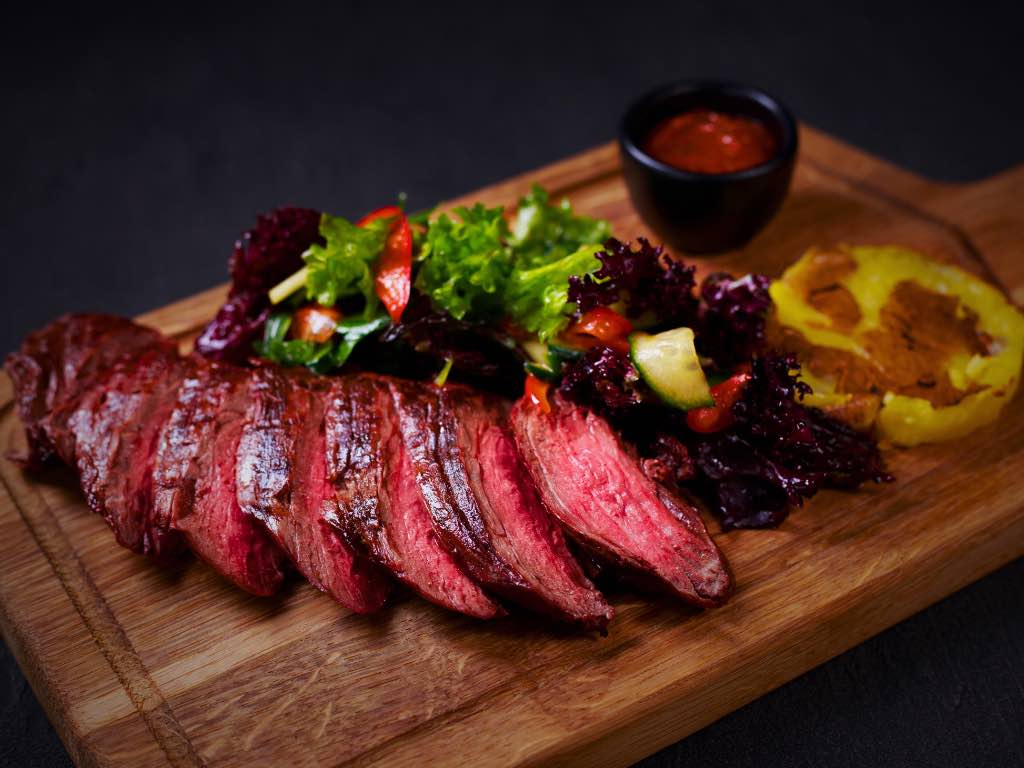
Sustainable Meat: Redefine the Way We Eat and Preserve Our Environment
|
|
Time to read 4 min
Welcome to One Stop Halal!
Written by: Imran Shaikh
|
|
Time to read 4 min
Sustainable meat has become an increasingly important topic as more people seek environmentally friendly and ethically produced food options. But what does sustainable meat really mean, and why does it matter? This blog will dive into sustainable meat production, exploring its definition, fundamental principles, and the significance of choosing sustainable options. We will also discuss sustainable meat production's environmental, social, and health benefits. By understanding the impact of our food choices and supporting sustainable practices, we can contribute to a healthier planet and promote more ethical and responsible food systems.
Sustainable meat refers to meat products that are produced in a manner that minimizes negative environmental impacts, prioritizes animal welfare, supports local communities, and ensures the long-term viability of the industry. It encompasses various aspects of production, including animal rearing, feed sourcing, farming practices, and processing methods.
Choosing sustainable meat has significant positive effects on the environment. Here are some key environmental benefits associated with sustainable meat production:
Sustainable meat production emphasizes responsible land management practices that help conserve natural resources. It includes practices such as rotational grazing, where animals are moved to different pasture areas, regenerating the land and reducing overgrazing. This approach promotes soil health, prevents erosion, and preserves biodiversity.
Sustainable meat production aims to minimize greenhouse gas emissions contributing to climate change. Pasture-based systems and regenerative grazing techniques can sequester carbon in the soil, helping offset emissions. Sustainable farmers often implement strategies to optimize manure management, reducing methane emissions, a potent greenhouse gas.
Sustainable meat production promotes responsible water usage. Farmers employ efficient irrigation methods, implement water conservation practices, and prioritize water quality. Sustainable meat production helps preserve water resources for future generations by minimizing water usage and preventing contamination.
Sustainable meat production focuses on reducing reliance on fossil fuels. This includes minimizing energy consumption in farming operations and transportation. Sustainable farmers may use renewable energy sources, such as solar or wind power, to power their operations, reducing their carbon footprint.
Sustainable meat production recognizes the importance of preserving natural ecosystems. Sustainable farmers help protect wildlife habitats and maintain the delicate balance of ecosystems by adopting practices that promote biodiversity and avoid habitat destruction.
Choosing sustainable meat supports environmentally responsible farming practices contributing to a healthier planet. Individuals can play a role in mitigating climate change, conserving natural resources, and safeguarding ecosystems for future generations by opting for meat produced through sustainable methods.
Welcome to the Home of the Halal Grass-fed Grass-finished Beef. Our cattle are pasture raised on lush-green American pastures and raised without antibiotics, steroids, or added growth hormones. We carry custom cuts of Grass-fed Beef that are hard to find in your nearby grocery stores. We deliver to your doorstep anywhere in the United States within 1-2 business days.
Sustainable meat production places a strong emphasis on animal welfare and ethical meat choices. Here are some key aspects highlighting the importance of these factors in sustainable meat production:
Sustainable meat producers prioritize providing animals with humane living conditions. This includes access to open spaces, clean air, and natural lighting. Animals are given ample room to move and express their natural behaviors, reducing stress and promoting overall well-being.
Animals raised in sustainable meat systems are fed natural diets appropriate for their species. They are given access to pasture or forage, allowing them to graze and consume a diet that aligns with their natural dietary needs. This results in healthier animals and higher-quality meat.
Sustainable meat producers minimize or eliminate growth-promoting hormones and routine antibiotics. This approach reduces the risk of antibiotic resistance, promotes healthier animals, and ensures that meat products are free from potentially harmful residues.
Sustainable meat production strongly emphasizes the ethical treatment and handling of animals throughout their lives. Animals are handled with care and respect during transportation and at processing facilities, minimizing stress and avoiding unnecessary harm.
Sustainable meat producers often provide transparency regarding animal welfare practices. They may seek certifications such as Animal Welfare Approved, Certified Humane, or Global Animal Partnership, which verify that their animals are raised following high animal welfare standards.
By choosing sustainable meat, consumers can support the ethical treatment of animals and contribute to improving animal welfare practices in the food industry. Supporting sustainable meat production encourages responsible and compassionate farming practices that prioritize the well-being of animals throughout their lives.
Sustainable meat production can have positive social and community impacts. Local and small-scale farmers often adopt sustainable practices, promoting economic resilience and preserving traditional farming methods. By supporting sustainable meat, consumers can contribute to the local economy, promote fair trade practices, and help sustain rural communities.
Sustainable meat is often associated with higher quality and nutritional value. Animals raised on pasture and fed natural diets tend to produce meat higher in beneficial nutrients such as omega-3 fatty acids and antioxidants. Sustainable meat is also less likely to contain harmful additives, antibiotics, or hormones, promoting healthier food choices.
To support sustainable meat production, consumers can take several steps:
Understanding and choosing sustainable meat is essential to building a more environmentally friendly and ethical food system. By supporting sustainable practices, we can contribute to conservation efforts, promote animal welfare, and make healthier choices for ourselves and the planet. So, let's embrace the concept of sustainable meat and make informed decisions that align with our values, ultimately creating a more sustainable and responsible food future for generations to come.

© 2026 One Stop Halal, Inc.